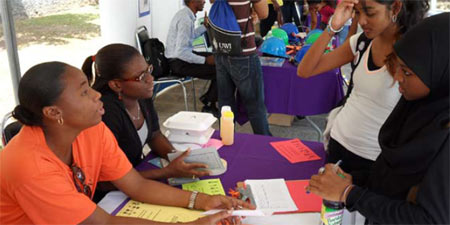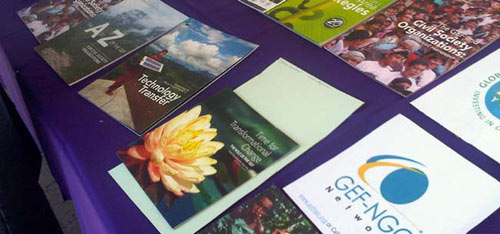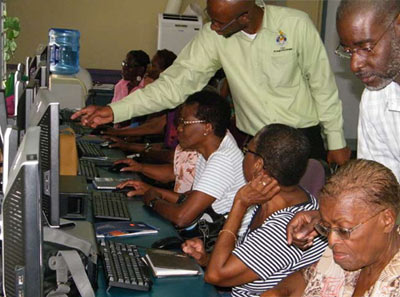 |
 |
 |
|
March 2013 |
“I must show you this,” she says, bobbing right up as she sat down. She opens a box lying on the tabletop. It contains a glass plaque; an award from the Cyril Ross Nursery and the Society of St Vincent de Paul to Richard Acosta for outstanding and dedicated service over the years. “When Richard got this, he immediately handed it over to UWI,” she says. The community volunteer told her that he had approached Student Advisory Services to help with tutoring and since then UWI students have been visiting and helping. He passed on the plaque as a token of his appreciation. That gesture filled the Deputy Principal of the St Augustine Campus, Professor Rhoda Reddock with obvious warmth and pride. It is one of the ways she knows her Office is doing the right things.
Richard’s plaque invokes a feeling that her students are doing the right things too; giving time and energy to communities in ways that bring all-round benefits. Community service-learning and engagement are concepts high on universities’ agendas now. It can earn students course credits and provide practical experience, but it also increases the sense of civic responsibility and awareness among young people. Two years ago, the Deputy Principal’s Office made a presentation encouraging the wider adoption of community engagement practices in mainstream coursework for credit, which could be the basis as well for community based research in conjunction with or on behalf of NGOs and other organisations. She is very passionate about these matters which she links to developing students to become well-rounded citizens. It’s one thing to be competent in a subject but you need a broad range of skills to make it in the world, she says, rattling off a host of them: interpersonal skills, self-confidence, critical thinking, knowledge of one’s history … It requires a more regional curriculum. “I think we try to keep up to date with the global developments in our field and that’s important, but I think we also have to make sure our students are aware of regional thinkers, regional scholarship and our contribution to knowledge in the world, so that we are not just people who absorb knowledge from elsewhere, but know that we can create knowledge and influence global discourses, global innovations, etc.” She believes it is a question of building what she terms “cultural confidence.” “I think we have such a poor opinion of ourselves and lack of self confidence that we constantly question what we have rather than seek to develop it. That is why I am very pleased with some of the research that has taken place in the area of steelband innovation and I am glad that UWI has been involved despite some of the controversies, which I hope can eventually be resolved.” It comes back to rethinking the nature of the education system. “I really believe sometimes our formal structures remove a lot of the creativity in young people or pushes it to the margin so it comes out in criminal activity, dishonesty, the tricks that we develop… so we have to find a way to involve all the young people we are losing now, who kind of attend school but basically continue to be on the margin of the entire educational activity.”
“It was recently brought home to us with the case from the Faculty of Medical Sciences; that was a horrible experience for the students to be held up and robbed in a classroom,” she said, noting that it was the first time something like that had happened and it suggested a “major transition to another level” that required more than higher level security. “I think we also have to engage with the communities around the campus so that they see us as partners and not as a sitting duck to be preyed upon. I think the campus has to be much more visible. We look forward to partnering with the communities surrounding the campus in programmes that would be beneficial both to the community and to the university,” she says, tying it back into the community engagement initiative. “We can do this by research, we can do this by having programmes using some of the skills that the departments have, community service programmes, service learning programmes; there is quite a lot of scope… for example the School of Dentistry’s oral health programme. Also, there is the free eye testing from the ophthalmology programme. These are part of the service learning aspects and I think we need to strengthen that and also our community service and general engagement with communities surrounding campus and we are working towards that.” By Vaneisa Baksh
RESPONSIBLE FOR:The Office of the Deputy Principal, with its direct responsibility for the wellbeing and development of students, has direct responsibility for the following departments and units at the St Augustine Campus:
The ODP also deals with student issues emanating from the International Office and the campus security, and has oversight for the Guild of Students and the campus concessionaires. PROGRAMMES
|


 Apart from senior managerial functions and deputizing for the Principal when the occasion arises, the Deputy Principal has complete responsibility for a broad range of matters pertaining to the Campus. Primary among them is student matters. Anything to do with students – development, housing, counselling, health, sport, community services, special needs, grievances, everything – falls under her portfolio.
Apart from senior managerial functions and deputizing for the Principal when the occasion arises, the Deputy Principal has complete responsibility for a broad range of matters pertaining to the Campus. Primary among them is student matters. Anything to do with students – development, housing, counselling, health, sport, community services, special needs, grievances, everything – falls under her portfolio.  She talks about criminal activity in and around the St Augustine campus, and feels that apart from the University doing everything it can to beef up security systems, it needs more community engagement.
She talks about criminal activity in and around the St Augustine campus, and feels that apart from the University doing everything it can to beef up security systems, it needs more community engagement.  Service Learning and Community Engagement
Service Learning and Community Engagement